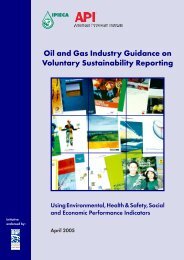Technology Cooperation and Capacity Building - CommDev
Technology Cooperation and Capacity Building - CommDev
Technology Cooperation and Capacity Building - CommDev
You also want an ePaper? Increase the reach of your titles
YUMPU automatically turns print PDFs into web optimized ePapers that Google loves.
TECHNOLOGY COOPERATION AND CAPACITY BUILDING… Setting the sceneInstitute’s STEP programme (see boxon page 10).The industry has produced morespecific guidelines such as the CanadianAssociation of Petroleum Producers(CAPP) Code of Practice, <strong>and</strong> theguiding principles, jointly produced byEUROPIA <strong>and</strong> E&P Forum. Otherexamples are the E&P Forum’sguidelines for environmental protectionwhich address operations in tropicalrain forests, mangroves, <strong>and</strong> Arctic <strong>and</strong>sub-Arctic onshore regions. Thesepublications are designed for individuals<strong>and</strong> organizations involved in oil <strong>and</strong>gas exploration in environmentallysensitiveareas, <strong>and</strong> are also meaningfulbecause they are the product of apartnership between an NGO, theWorld Conservation Union, <strong>and</strong> an oilindustry association, E&P Forum.In summaryThe importance of business <strong>and</strong> industrywas acknowledged at UNCED <strong>and</strong> isreferred to in Chapter 30 of Agenda 21:‘Business <strong>and</strong> industry, includingtransnational corporations, play a crucial rolein the social <strong>and</strong> economic development of acountry <strong>and</strong> should recognize environmentalmanagement as among the highest corporatepriorities <strong>and</strong> as a key determinant tosustainable development.’Private <strong>and</strong> official flows to developing countries, 1989–94financial flows (US$billions)250200150100500private flowsofficial flows1989 1990 1991 1992Overall, the volume of private capital flows to developing countries has quadrupled since the turnof the decade.The oil industry agrees with thisstatement <strong>and</strong> recognizes it has animportant role to play in contributingtowards sustainable development.Although the oil industry is reducing anon-renewable fossil fuel resource, it isstriving to minimize environmentalimpacts so that they are within thecarrying capacity of the affectedecosystems. This requires theintegration of environmentalprotectionplanning <strong>and</strong> managementinto economic decision making <strong>and</strong>engineering design. The wealth <strong>and</strong>employment created by the businesssector must also be used to fight thebattle against both poverty <strong>and</strong>environmental damage. Since poverty isamong the greatest threats to theenvironment, its elimination is a1993 1994fundamental step in protecting theenvironment.The growing importance of thebusiness sector in promoting a moresustainable future is highlighted by thefact that private financial flows todeveloping countries have nowoutstripped official aid (see graph).The oil industry—which plays a keyrole in private financial flows—hasgained experience over many decades inthe forms of partnership reflected inAgenda 21’s recommendations. Thecase studies that follow bear witness tothis fact, <strong>and</strong> illustrate the variety ofways in which technology cooperation<strong>and</strong> capacity building, initiated by theoil industry, is contributing to the goalof environmentally-sound development.Source: World Debt Tables, 1994–9513


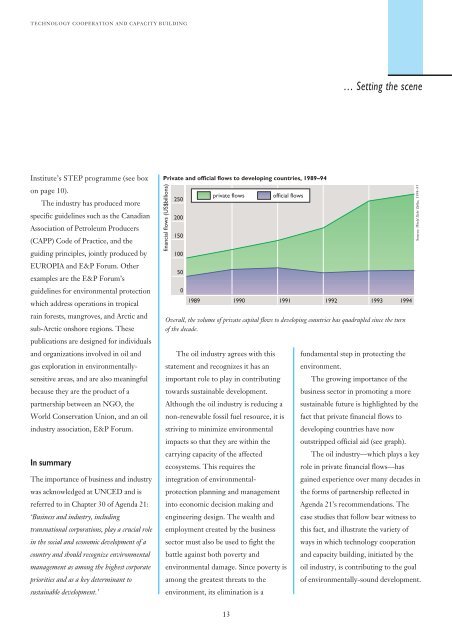

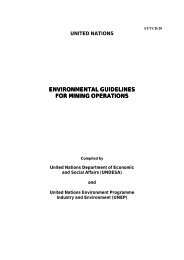
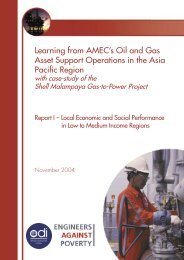
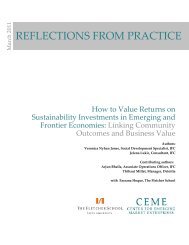
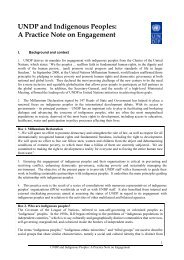
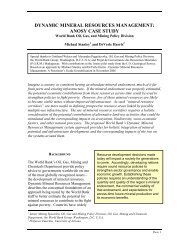
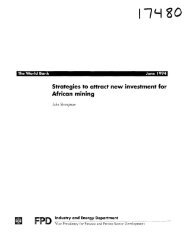

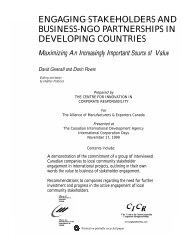



![[PDF] Community Development Toolkit - CommDev](https://img.yumpu.com/48616495/1/184x260/pdf-community-development-toolkit-commdev.jpg?quality=85)
